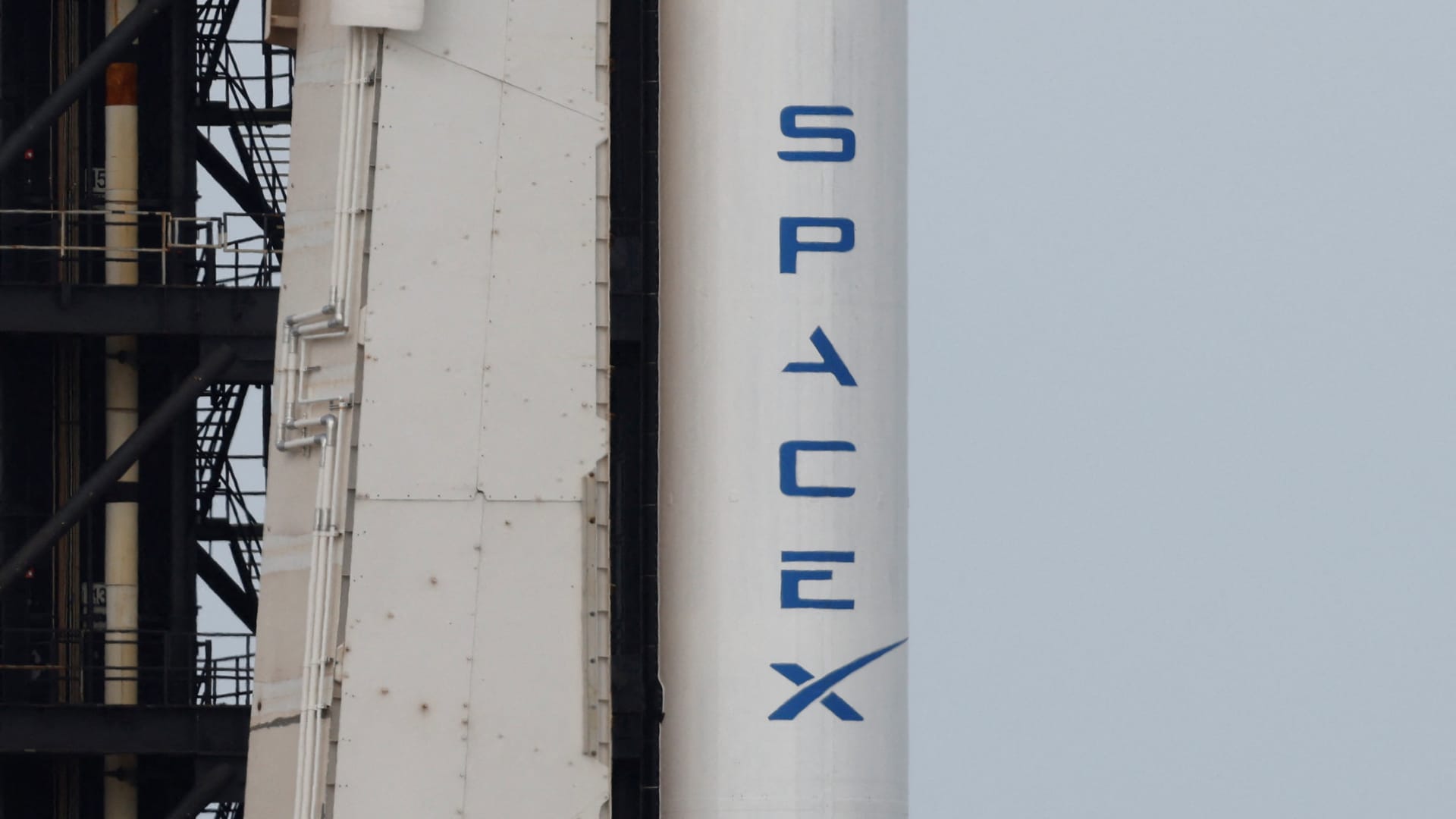The SpaceX logo is shown on a Falcon 9 rocket as it is prepared for launch to carry NASA’s SpaceX Crew-8 astronauts Matthew Dominick, Michael Barratt, and Jeanette Epps, and Roscosmos cosmonaut Alexander Grebenkin to the International Space Station at the Kennedy Space Center, in Cape Canaveral, Florida, U.S., March 2, 2024.
Joe Skipper | Reuters
Elon Musk‘s SpaceX, United Launch Alliance and Jeff Bezos‘ Blue Origin on Friday won U.S. Space Force rocket launch contracts worth a combined $13.5 billion through 2029 to send some of the Pentagon’s most sensitive and complex satellites into space.
The Space Force’s flagship National Security Space Launch procurement program will assign roughly 54 missions through 2029 in incremental task orders, according to its Space Systems Command office.
SpaceX, awarded 28 of the missions, won $5.9 billion. ULA, the joint venture of Boeing and Lockheed Martin, won $5.3 billion for 19 missions. Blue Origin got seven missions worth a combined $2.3 billion, with those planned for launch in a later year.
Reuters earlier reported SpaceX and ULA were tapped for the awards.
The program, the most competitive and lucrative U.S. launch effort, effectively affirms the companies as the most capable American rocket providers, though Blue Origin’s New Glenn rocket has launched once in January and has less experience than SpaceX’s and ULA’s rockets.
SpaceX, with its Falcon 9 rocket, is the world’s most active launch company. It has launched dozens of military space missions in recent years. The company said it will use Falcon 9 and its more powerful Falcon Heavy — three Falcon cores strapped together — for the Phase 3 missions.
ULA’s new Vulcan rocket had its first two launches last year. The Pentagon certified Vulcan for national security missions this month after months of review into a mishap with its solid rocket motors during one of its flights.
The awards are part of the Phase 3 program’s “Lane 2” track. That track contains the Pentagon’s most difficult and expensive missions, involving a variety of complex orbits around Earth, for which only the top U.S. launch companies with the most experience are to compete.
SpaceX, according to two people familiar with the plans, will get a vast majority of the missions ordered by the Space Force in the first year of the program. The company’s launch rate with Falcon 9 is far greater than ULA and Blue Origin’s.
SpaceX CEO, Musk, a special government employee and close ally of President Donald Trump, has wielded enormous influence over the U.S. government, from slashing federal agencies in his government efficiency effort to pushing allies to lead federal agencies that oversee billions of dollars’ worth of SpaceX government contracts.
Friday’s awards have been years in the making. It is a third phase of a program governing how the U.S. Defense Department purchases rides to space for its military and intelligence satellites, a lucrative area of government procurement once dominated by the Boeing and Lockheed Martin joint venture, United Launch Alliance.
SpaceX has risen in the past decade to become a dominant launch player. Its reusable Falcon 9 rockets offer a cost-cutting capability its rivals have been slower to match, making the company a key vendor for the Pentagon, which is also increasingly reliant on the company for satellite-based military intelligence.
In an earlier phase of the national security launch program, Phase 2, SpaceX won 40% of the missions while ULA got 60%, representing over $6 billion in missions combined.
Some missions originally assigned to ULA under Phase 2 had to be transferred to SpaceX over development delays with ULA’s Vulcan rocket, which had frustrated Pentagon officials.
“We are very pleased to be awarded 40 percent of the Phase 3 procurement,” ULA CEO Tory Bruno said in a statement. “Vulcan is the right choice for critical national security space missions and is the only rocket today designed to meet all the requirements of our nation’s space launch needs.”
With SpaceX emerging as a dominant winner in the program, Musk nonetheless took a jab at SpaceX’s rivals on X, his social media platform.
“Winning 60% of the missions may sound generous, but the reality is that all SpaceX competitors combined cannot currently deliver the other 40%! I hope they succeed, but they aren’t there yet,” he said.





